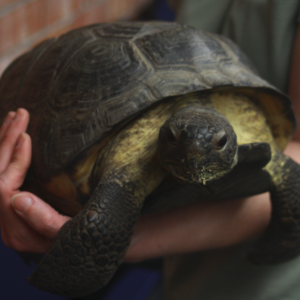Earth Day is a national event where many embrace the world’s natural resources by planting trees, recycling, cleaning up litter and becoming more aware of conservation methods that people can do everyday.
Earth Week has been a DMACC tradition for many years and each year the Student Activities Center (SAC) assemble events to bring awareness of living more efficient lives through sustainability.
Erin Smith, Coordinator of Student Activities and event planner of Earth Week, hopes to achieve awareness and developing events that will have students to want to participate in.
“I think that you get here, park your car in the parking lot and go into a building and not necessarily think about the campus,” Smith said. “You are making an impact on campus and I think that coming to class and doing your work, you don’t think about the impacts that you are making. “
On Monday, Blank Park Zoo held an animal presentation that involved a few friends. Blank Park Zoo K-12 Education Specialist, Angela Tague, brought her friends to discuss awareness of protecting these animals’ habitat for the start of the Earth Week.
From a fox snake to a turtle, Tague enlightened the crowd with many conservation methods that help protect these animals.
“I believe that having a zoo helps bring awareness to everyone about the way these animals live, and the Blank Park Zoo does a great job providing stable and natural habitats for these animals,” Tague mentioned in her presentation. “By watching and observing these animals, people can come to an understanding of how precious these animals are and feel the need to protect them.”
The message that Tague wants to express is the need for pollinators in the ecosystem. Ranging from bees to butterflies, pollinators are a key species in the ecosystem because this species helps circulate the cycle and keep many animals and humans alive.
As the week went on, other events that Earth Week held were painting bat houses, cleaning up the campus, and a workday at Neil Smith’s Wildlife Refuge. However, on Friday, a series of tree plantings encouraged volunteers to help bring different types of tree species to the campus, such as Catalpa, and soon create a well-developed ecosystem.
“Right now, half of the campus are Ash [trees], and the problem with Ash Trees are that there are too many of them on campus. And we are trying to make sure that what gets planted next on campus are a different species in order to reach an efficient ecosystem,” Diane Brockshus, horticulture student and also a volunteer at the tree planting event said.
On Friday, tree-planting volunteers planted 15 trees with a very low cost of $400 and all of the trees were purchased from the Horticulture department. Meanwhile, by participating, a few felt as they were fulfilling the Earth Day holiday.
“I want to make the community a better place and, by planting more trees, we are providing more oxygen and creating healthier air for our campus,” Luke Zimmerman, kinesiology major and student volunteer said.
Meanwhile, another volunteer believes that his effort in planting a tree has brought a relieving, satisfying feeling.
“The more people there are [at the tree planting], the easier it is,” Carson Bormann, student volunteer and mechanical engineer major said.
There have been many accomplishments that Earth Week achieved. For example, there are now 15 new trees around campus and there is no trash around the DMACC lake.
“It is satisfying to know that we are making a change here on campus,” Bormann said.





Comments